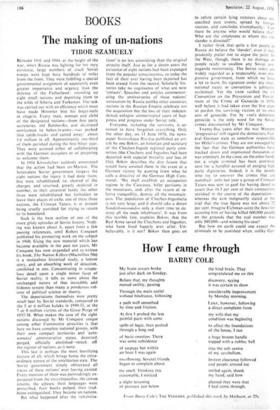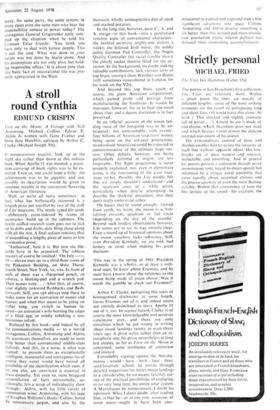BOOKS The making of un-nations
TIBOR SZAMUELY
Between 1941 and 1944, at the height of the war, when Russia was fighting for her very existence, large numbers of crack Soviet troops were kept busy hundreds of miles from the front. They were fulfilling a special governmental assignment of apparently even greater importance and urgency than the defence of the Fatherland: rounding up
eight small nations and deporting them to
the wilds of Siberia and Turkestan. The task was carried out with an efficiency which must have made Himmler bite his finger-nails in chagrin. Every man, woman and child of the designated nations—from first party secretaries, old Bolsheviks, and decorated servicemen to babes-in-arms—was packed into cattle-trucks and carted away: about 1.6 million in all. Approximately one-third of them perished during the first bitter year. They were accused either of collaborating with the German occupiers or of preParing to welcome them.
In 1956 Khrushchev suddenly announced that the action had been un-Marxist. The benevolent Soviet government forgave the eight nations the injury it had done them; five were rehabilitated, i.e. cleared of the charges, and returned, greatly depleted in number, to their ancestral lands; the other three were rehabilitated but forbidden to leave their places of exile; one of these three nations, the Crimean Tatars, is at present being cruelly punished for trying to return to its homeland.
Such is the bare outline of one of the more grisly episodes of Soviet history. Noth- ing was known about it, apart from a feiv passing references, until Robert Conquest published his pioneering work on the subject in 1960. Using the new material which has become available in the past ten years, Mr Conquest has now expanded and re-written
his book. The Nation Killers (Macmillan 50s)
is a meticulous historical study, a horror story, and an absorbing work of detection, combined in one. Concentrating in scrupu- lous detail upon a single minor facet of Soviet reality, it tells us more about the unchanged nature of that incredible and hideous system than many a ponderous vol- ume of political science or theory.
The deportations themselves were pretty small beer by Soviet standards, compared to the 5 or 6 million kulaks in 1930-33, or the 7 or 8 million victims of the Great Purge of 1937-38. What makes the case of the eight nations discussed by Mr Conquest unique among other Communist atrocities is that
here we have complete national groups, with their own compact territories and 'auto- nomous' administrative status, deported, purged, officially abolished—struck off the register of nations, as it were.
This last is perhaps the most horrifying feature of all, which brings home the extra- ordinary nature of the totalitarian state. The
Soviet government simply obliterated all traces of these nations' ever having existed.
Every mention of them was painstakingly ex- purgated from the encyclopaedias, the census returns, the atlases; their languages were proscribed. their books pulped. their trad- itions extinguished. They became un-nations.
But what happened after the 'rehabilita-
tions' is no less astonishing than the original atrocity itself. Just as for a dozen years the existence of eight nations had been expunged from the popular consciousness, so today the fact of their ever having been deported has been erased from the record. Scholarly his- tories take no cognisance of what are now 'unfacts'. Speeches and articles commemor- ating the anniversaries of these nations' annexation by Russia (unlike other countries, nations in the Russian Empire celebrate not the acquisition but the loss of their indepen- dence) eulogise uninterrupted years- of hap- piness and progress under Soviet rule.
Everyone, including the survivors, is as- sumed to have forgotten everything. Only the other day, on 13 June 1970, the news- paper Sovietskaya Rossiya published an art- icle by one Bokov, an historian and secretary of the Chechen-1ngush regional party com- mittee (the Chechens and Ingushes had been deported with especial brutality and loss of life). Bokov describes the dire future that would have awaited them in the event of a German victory by quoting from what he calls a directive of the German High Com- mand: 'We shall establish an occupation regime in the Caucasus. billet garrisons in the mountains, and, after the return of re- lative tranquillity, destroy all the mountain- eers. The population of Chechen-Ingushetia is not very large, and it should take a dozen Sonderkommandos only a short time to de- stroy all the male inhabitants'. It was from this terrible fate, explains Bokov, that the Red Army saved the Chechens and Ingushes, who have lived happily ever after. Un- believable, is it not? Bokov then goes on to refute certain lying rumours about un- specified past events, spread by foreign sources, and concludes triumphantly: 'Can there be anyone who would believe this? Who are the simpletons at whom this Vile slander is directed?'
1 rather think that quite a few people in Russia do believe the 'slander', even if they prudently prefer not to argue the point. In the West, though, there is no shortage of people ready to swallow any Soviet pro- paganda monstrosity. The Soviet rulers are widely regarded as a respectable, even pro- gressive government, from which we have a lot to learn. Its signature under any inter- national treaty or convention is jubilantly acclaimed. Yet the USSR ratified the IN Convention on the Prevention and Punish- ment of the Crime of Genocide in 1954, well before it had taken even the first steps to pardon the surviving victims of its own acts of genocide. For by uNo's definition genocide is the only word for the Soviet crimes documented by Mr Conquest.
Twenty-five years after the war Western `progressives' still regard the democratic Fed- eral German state as somehow responsible for Hitler's crimes. They are not assuaged by the fact that the German authorities have tracked down and imprisoned thousands of war criminals. In the USSR, on the other hand• not a single criminal has been punished. save for a handful accused of purging high party dignitaries. Indeed, it is the people who try to uncover the crimes that are punished: only last year a group of Crimean Tatars was sent to gaol for having dared to assert that 46.3 per cent of their compatriots perished in the course of the deportation— whereas the KGB indignantly stated at the trial that the true figure was not above 22 per cent. Imagine Eichman suing the Jews for accusing him of having killed 600.000 people on the grounds that the real number was only 300.000--and winning his case!
But how on earth could one expect the criminals to be punished when, unlike Ger-
many, the same party, the same system. in many cases even the same men who bear the responsibility remain in power today? The courageous General Grigorenko aptly sum- med up the situation when he told his Crimean Tatar friends: 'You think you have only to deal with honest people. This is not the case. What was done to your nation was not done by Stalin alone. And his accomplices are not only alive but hold- ing responsible offices.' It is about time that this basic fact of international life was pro- perly appreciated in the West.































 Previous page
Previous page